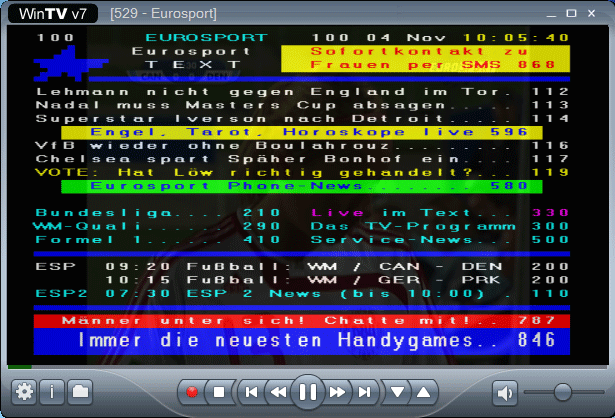

Adding to that, the fact that TV sets only supported one or the other but not both made choosing a Teletext-capable TV even harder and contributed to the waning of interests in the feature. NABTS was superior to WST in that it could display advanced graphics, but that only drove the cost of receivers and TV sets up as it required a far more powerful CPU for decoding the graphics and text. Complicating matters was that a competing, incompatible Teletext system backed by CBS and NBC called NABTS note North American Broadcast Teletext System was also pushed to the market- TBS had used a modified-for-NTSC version of the World Standard Teletext system, which is what the Ceefax system is known as outside of the UK. TBS (or, as it was known then, Superstation WTBS) had a service called Electra for a while in the 80s, but it was shut down due to lack of interest and funding (the other partners in the venture, Zenith Electronics and Taft Broadcasting had stopped making Teletext-capable TV sets and undergone corporate buyouts, respectively). Multiple networks made attempts, but failed. Teletext never really took off in the US, though.

Teletext Limited, the company responsible for the ITV and Channel Four services, had a handful of other businesses, including a holiday shop TV channel, which will remain open-and oddly, continue to use the Teletext brand. On most services, one can also get the time and channel name from Teletext several TV sets from Sony sold in Europe and Asia could display the channel name under the channel number if Teletext was transmitted on the channel additionally a button on the remote could bring up the current time and date for several seconds. Memorably described as a pound-shop version of the Internet. Before the Internet, this was the way you got the footy scores note Or if you're in Singapore, Malaysia, Hong Kong, and Spain, stock market information and lottery results. Most notable for its limited number of characters, the general BBC Micro-ish look of the thing note which it came by honestly Teletext pages were created using one and the fact that you'd at times have to wait for several pages to load, Teletext doesn't crash under heavy user demand note However, if you have poor television reception, the service may be tenuous to use- the readability of the service correlates directly with how clear your TV reception is, and not having a good reception results in garbled or missing text, if anything comes up at all.

Teletext is basically a continuously updated news feed transmitted through your TV (in gaps in the signal), developed in the United Kingdom in the 1970s and being used worldwide. One of the coolest things on your TV before digital set-top boxes, on-demand movies and Freeview.


 0 kommentar(er)
0 kommentar(er)
